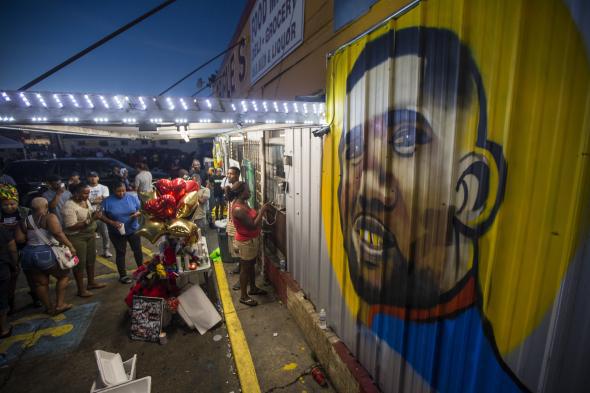The Justice Department will not charge the white police officers responsible for shooting and killing Alton Sterling at a Baton Rouge, Louisiana convenience store last July. The DOJ has not yet made an official announcement, but multiple sources are reporting, that it is closing its case against the two white police officers. This is the first instance new Attorney General Jeff Sessions, who has positioned himself as hardliner inclined to back police, has decided not to charge officers for potential police misconduct.
Video shot on a phone showed the 37-year-old Sterling being pinned down by police officers outside the Triple S convenience store, where Sterling often sold CDs. The police account of the night said they had received a report of a man who fit Sterling’s description threatening someone with a gun outside the store. Both officers were wearing body cameras, but according to the police department, the cameras fell off and did not catch the shooting. In the phone video taken by a bystander, Sterling was already on his back, next to a car before one of officers shouts, “he’s got a gun!” One officer is seen immediately drawing his weapon, and moments later shots were fired. Sterling was shot multiple times in the chest and back and declared dead at the scene. Police say a small handgun was found in Sterling’s pocket.
From the Times-Picayune:
Sterling was most familiar around town for selling CDs in the parking lot of the Triple S, in largely poor north Baton Rouge. Most days, from late in the afternoon until the early morning hours, Sterling could be found leaning over a table in the parking lot, playing music and selling discs to those in the neighborhood. People called him Alton, “Big A” or just “CD man,” said Jonathon Banks, a frequent customer of Sterling’s.
Sterling’s death came during a particularly traumatic string of police-related violence last year. The day after Sterling was killed, Philando Castille was shot to death by police during a routine traffic stop in Minnesota. One day later, a sniper opened fire amidst protests in Dallas, Texas, killing five officers and wounding seven more.
In Baton Rouge, as in many cities where similar shootings have taken place, protests broke out following Sterling’s death. The outrage and demonstrations, however, never overheated. “One reason the protests in Baton Rouge didn’t escalate to the violence-filled, store-looting, community-destroying proportions seen earlier in Ferguson, Mo., and Baltimore is that Louisiana officials moved quickly to remove local law enforcement from the Sterling investigation,” according to the Times-Picayune. “[The Governor], with the head of State Police and state legislators from north Baton Rouge by his side, announced the day after Sterling’s death that he was requesting the Justice Department lead the investigation.” A little more than a week after Sterling’s death, tragedy and tumult struck the community again, as a man traveled from Kansas City and ambushed local police officers, killing three Baton Rouge cops.
The decision not to charge the officers has raised concerns among civil rights activists that the Sessions-led DOJ under Trump will not aggressively go after officers who are accused of misconduct. Sessions has already taken steps to scale back mandated police reforms for poorly performing departments. The Department of Justice has another high-profile investigation underway to determine if there was misconduct in the 2014 choking of 43-year-old Eric Garner by officers in New York City.
